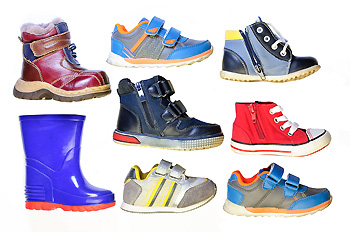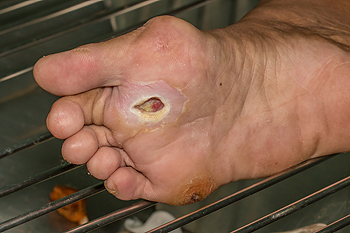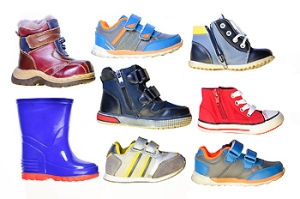
Why Live with Pain and Numbness in Your Feet?
Arthritis Can Cause Pain in the Feet and Ankles
Foot Conditions Children May Have
 New parents may notice their children are born with flat feet. This is a result of supporting muscles and ligaments that have not fully formed. The arch typically develops as the teenage years approach, and it is generally nothing to be concerned about. Additionally, it is common for children to walk with their toes in or out, and in most cases, will be outgrown. If children frequently participate in sporting activities, you may see blisters on their feet. This can come from wearing shoes and socks that do not fit properly. Children can be susceptible to bunions, especially if it is genetic. A large bump on the side of the big toe may form, and it may cause the second toe to overlap with the one next to it. If you notice anything unusual about your children’s feet, it is advised to consult with a podiatrist who can determine what the best course of treatment is.
New parents may notice their children are born with flat feet. This is a result of supporting muscles and ligaments that have not fully formed. The arch typically develops as the teenage years approach, and it is generally nothing to be concerned about. Additionally, it is common for children to walk with their toes in or out, and in most cases, will be outgrown. If children frequently participate in sporting activities, you may see blisters on their feet. This can come from wearing shoes and socks that do not fit properly. Children can be susceptible to bunions, especially if it is genetic. A large bump on the side of the big toe may form, and it may cause the second toe to overlap with the one next to it. If you notice anything unusual about your children’s feet, it is advised to consult with a podiatrist who can determine what the best course of treatment is.
Making sure that your children maintain good foot health is very important as they grow. If you have any questions, contact one of our podiatrists of Pennsylvania. Our doctors can provide the care you need to keep you pain-free and on your feet.
Keeping Children's Feet Healthy
Having healthy feet during childhood can help prevent medical problems later in life, namely in the back and legs. As children grow, their feet require different types of care. Here are some things to consider...
Although babies do not walk yet, it is still very important to take care of their feet.
Avoid putting tight shoes or socks on his or her feet.
Allow the baby to stretch and kick his or her feet to feel comfortable.
As a toddler, kids are now on the move and begin to develop differently. At this age, toddlers are getting a feel for walking, so don’t be alarmed if your toddler is unsteady or ‘walks funny’.
As your child gets older, it is important to teach them how to take care of their feet.
Show them proper hygiene to prevent infections such as fungus.
Be watchful for any pain or injury.
Have all injuries checked by a doctor as soon as possible.
Comfortable, protective shoes should always be worn, especially at play.
If you have any questions please feel free to contact one of our offices located in Plymouth Meeting and Ambler, PA . We offer the newest diagnostic and treatment technologies for all your foot and ankle needs.
What to Do to Keep Your Child’s Feet Healthy
Being a parent involves caring for your child in every way you can. You make sure they are eating the right food, being nice to others, and staying out of any trouble. However, it is also important that you are watchful of their health, more specifically their foot health. Maintaining good foot health in childhood is important in preventing later conditions in life from happening. As children continue to develop, their feet require different techniques of care. Here are some various ways in which you can help your child’s feet stay healthy.
A baby needs a lot of care and attention overall, but the importance of their feet should never be forgotten. Before a baby turns one, their feet change and develop greatly. It is important that during this time, a mother avoids putting tight socks on their child. She should also encourage movement of their feet so the baby can begin to feel more comfortable using them.
As a baby enters the toddler years of his or her life, they are begin to walk around. When your baby begins to take those first steps, it is crucial that they are wearing protective shoes on their feet. As a mother that is observant of your child’s feet, you may notice changes in them. This is completely normal as the feet are becoming susceptible to the activity of walking. It is normal for a toddler to be a bit unsteady or to “walk funny” at first.
When your child grows out of their toddler years, it is important that you begin to show him or her how to care for their feet on their own. Practice with your child proper hygiene in order to prevent foot fungus or infection. Since children are constantly on the move, it is crucial to be cautious of any accidents or injuries that might occur. If an injury occurs, it is advised that you take your child to be examined by a doctor immediately. Since your child is still growing, particular injuries can shift the way in which a bone or other important part of the foot is developing.
Babies and kids are always changing and growing. Your job as a parent is to make sure they stay healthy and making sure they are properly maintained. This involves proper foot care and making sure the feet stay healthy. Following this guide, your child can live a long and happy life.
Three Phases of Wound Healing
 Patients who have wounds on their feet may experience difficulty in walking, in addition to having severe pain and discomfort. Chronic foot wounds can occur for a variety of reasons. These may include having diabetes, recovery from surgery, or if there has been a severe burn. Research has indicated there are three phases of the healing process. The first stage is referred to as the inflammatory phase in which the blood vessels naturally constrict to form a clot. This is followed by the fibroblastic stage that allows the protein source that is referred to as collagen to help the wound to heal and close. The last stage is known as the maturation phase, and as the wound continues to heal, it will typically form a scar. If you would like additional information about foot wounds, it is suggested that you speak with a podiatrist.
Patients who have wounds on their feet may experience difficulty in walking, in addition to having severe pain and discomfort. Chronic foot wounds can occur for a variety of reasons. These may include having diabetes, recovery from surgery, or if there has been a severe burn. Research has indicated there are three phases of the healing process. The first stage is referred to as the inflammatory phase in which the blood vessels naturally constrict to form a clot. This is followed by the fibroblastic stage that allows the protein source that is referred to as collagen to help the wound to heal and close. The last stage is known as the maturation phase, and as the wound continues to heal, it will typically form a scar. If you would like additional information about foot wounds, it is suggested that you speak with a podiatrist.
Wound care is an important part in dealing with diabetes. If you have diabetes and a foot wound or would like more information about wound care for diabetics, consult with one of our podiatrists from Pennsylvania. Our doctors will assess your condition and provide you with quality foot and ankle treatment.
What Is Wound Care?
Wound care is the practice of taking proper care of a wound. This can range from the smallest to the largest of wounds. While everyone can benefit from proper wound care, it is much more important for diabetics. Diabetics often suffer from poor blood circulation which causes wounds to heal much slower than they would in a non-diabetic.
What Is the Importance of Wound Care?
While it may not seem apparent with small ulcers on the foot, for diabetics, any size ulcer can become infected. Diabetics often also suffer from neuropathy, or nerve loss. This means they might not even feel when they have an ulcer on their foot. If the wound becomes severely infected, amputation may be necessary. Therefore, it is of the upmost importance to properly care for any and all foot wounds.
How to Care for Wounds
The best way to care for foot wounds is to prevent them. For diabetics, this means daily inspections of the feet for any signs of abnormalities or ulcers. It is also recommended to see a podiatrist several times a year for a foot inspection. If you do have an ulcer, run the wound under water to clear dirt from the wound; then apply antibiotic ointment to the wound and cover with a bandage. Bandages should be changed daily and keeping pressure off the wound is smart. It is advised to see a podiatrist, who can keep an eye on it.
If you have any questions, please feel free to contact one of our offices located in Plymouth Meeting and Ambler, PA . We offer the newest diagnostic and treatment technologies for all your foot care needs.
















